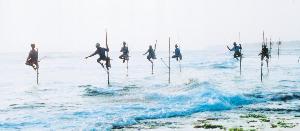
11th March 2001
Front Page|
News/Comment|
Editorial/Opinion| Business|
Sports| Mirror Magazine

![]()
More trouble in fishing waters
By Harriet Grant
 The
future of the world fishing industry is at present in serious jeopardy.
Virtually every commercial species of fish has been depleted, fully exploited
or over exploited. Nine of the worlds major fisheries are in serious decline
and four are depleted commercially. It is clear from talking to people
who gain their living from the seas around Sri Lanka that the effects of
over fishing are becoming more and more tangible. In combination with the
present economic crisis this is ensuring that life for local fishermen
is becoming increasingly untenable.
The
future of the world fishing industry is at present in serious jeopardy.
Virtually every commercial species of fish has been depleted, fully exploited
or over exploited. Nine of the worlds major fisheries are in serious decline
and four are depleted commercially. It is clear from talking to people
who gain their living from the seas around Sri Lanka that the effects of
over fishing are becoming more and more tangible. In combination with the
present economic crisis this is ensuring that life for local fishermen
is becoming increasingly untenable.
Due to the precarious nature of their profession the fishing communities have been hit particularly hard by the recent rise in the cost of living. While the women try to cope with the rise in prices of everyday necessities such as rice and vegetables, the men are faced with the increasing cost of nearly all the equipment which they need for fishing, as well as price hikes in diesel and ice. This has led to strikes in some areas, intended to draw attention to their plight. A plight they feel the rest of the country is oblivious to.
There are two main complaints among the fishermen; their lack of control over their income and the impact that illegal fishing methods are having on levels of stock.
One of the reasons that price rises have hit fishing communities particularly hard is that they have no control over the price they get for their fish. Once the fish is caught the fishermen have no means of preserving it; ice is expensive and getting more so. The mudalali buys all of their fish from them but at a price of his own choosing; unsurprisingly this is a price that benefits him not the fishermen. These men risk their lives to catch fish but when accidents happen the insurance money they have been paying often does not reach their family. Instead it lines the pocket of the mudalali again. Although there is a marked reluctance to blame the government for their problems the fishing communities want a fair deal; they do not feel they are getting one now.
The mudalali, unsurprisingly, has his own view of events. G.M.L. Hemachandra, who owns three vessels and is responsible for maintaining them all, claims he is now barely making a profit due to the rise in the cost of diesel and nets. He stresses that the precarious nature of fishing is no less so for him than it is for the fishermen. He blames his particular troubles on the lack of price controls, enabling the private companies to profit as the price of equipment goes up.
One of the major contributors to rural poverty in fishing communities is the increase in the use of illegal fishing methods. These methods are unsustainable and are wiping out entire species of fish, leading to further poverty for those fishermen who continue to use the old methods of their ancestors. In turn as the situation worsens those fishermen who have clung to the old methods will be tempted to cast them aside.
The two methods mentioned most frequently by disaffected fishermen are dynamite fishing and ambiioli or light fishing. Fishermen in Galle and in Matara both lamented the vanishing of entire species of fish. Ambili nylon nets are bag type nets weighted down with lead. The fish are attracted by a powerful light known as hebiidela and then indiscriminately dragged to the surface. The laarga, alaguduwa and ingura fish which used to be so plentiful they had to be buried have almost vanished. The fishermen in Matara have not seen any Alaguduwa for nine months. K. P. Gamini and Bandusena Punchihewa, told me how they used to bury the little Alaguduwa fish in a pit; there was such an abundance of it. There was enough for all the fishermen to eat their fill of it with some remaining for the poorer members of the community. Now the only fish that they can catch is mullet and the profits from one journey are very small. Men are beginning to leave the waters of Sri Lanka to catch fish; risking imprisonment as they do so.
Both the men in Galle and the men in Matara bemoan the lack of interest from the fisheries minister. The minister came to Matara and explained that the war limits the number of security personnel available for catching those who transgress fishing regulations. Twelve high powered boats patrol the waters of the region but the fishermen laugh at the fact that these boats have caught nobody. According to the police this is the fault of the fisheries ministry, according the ministry it is the fault of the police. The men laugh again as they recount this but the situation is far from funny. Bureaucrats argue over who is to blame while the future of Sri Lanka's entire fishing industry, not to mention the future of those who rely on it, seems more and more uncertain.







![]()
Front Page| News/Comment| Editorial/Opinion| Plus| Business| Sports| Mirror Magazine
Please send your comments and suggestions on this web site to

